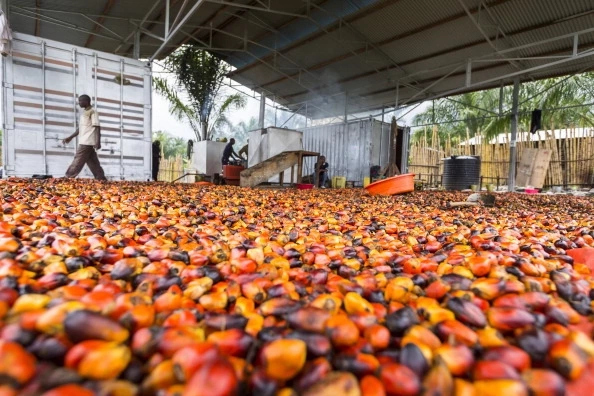How To Start Palm Oil Processing Business In Nigeria
The palm oil fruit is indigenous to Nigeria. It is derived from the fruit of the oil palm tree. Our climatic condition and soil naturally supports the growth of palm oil tree.
The palm oil is mostly found in the south east and western part of Nigeria. Everyday thousands of tonnes are being processed for daily consumption and use.
👉 Relocate to Canada Today!
Live, Study and Work in Canada. No Payment is Required! Hurry Now click here to Apply >> Immigrate to CanadaDespite the large rate of production and processing of palm fruit, Importation is still being made from Asian countries like Malaysia to help meet up with our daily need.
Read Also: How to Start Palm Oil Business in Nigeria

This has brought about the need for large and medium scale processing plants in the country. Unlike the large scale processing plant that is scarcely found, the medium scale processing plant are more commonly found in the country, which on average can process up to 55 tonnes of palm oil fruits daily.
The processing of palm oil has become a very lucrative form of business venture in Nigeria and this is as a result of the majority of the people who are ready to invest in it with great optimism of having maximum returns from the business.
These structures bring about profitability and stability. A good business plan is a basic requirement before any successful processing of palm oil can be achieved.
Hence the prerequisite for any successful business is having a good business plan. And also with a good source of Capital, the success of any business is easily attained.
Above is a flow chart explaining the processing of palm oil. I will further enlighten you on what palm oil processing involves.
Steps involved in palm oil processing
In the processing of palm oil into its finished produce the following steps are involved;
👉 Relocate to Canada Today!
Live, Study and Work in Canada. No Payment is Required! Hurry Now click here to Apply >> Immigrate to Canada1. Weighing and Transportation
This is important as it helps you to know the exact amount of palm oil to be produced and the cost at which the palm fruits were bought and harvested.
It is the general calculation of the amount invested into the production process before the oil processing begins in the mill.
Transporting of the palm fruits from the truck is also very important because if the fruits bunch are not properly moved from the truck to the processing point, there could be change in the PH level and taste of the palm fruits, which will eventually affect the general production process.
This is because a certain minimal PH level must be maintained throughout the processing of the palm fruits into pure palm oil.
Read Also: 4 Untapped revenue sources for Nigerian Governments apart from Oil
2. Threshing and Sterilization
At this stage the palm oil fruits are separated from their bunch. The palm oil fruits are then boiled at a very high temperature to soften the fruits, thereby making it easy for the palm fruits to be extracted.
Large palm oil mill plants place the fruits in rotatory drums to complete this process while small palm oil production facilities performs this process of threshing with their hands.
This method also helps in the sterilization of the fruits, thereby making them free of any form of contaminants. This process is known as sterilization by pressurized cooking.
3. Pressing/ Extraction of Palm oil
This is one of the most important part of the whole process because it is at this point that the oil is being extracted from the skin and pulp.
Some facilities place the fruits in large rotatory drums which starts to break down the fruits and releases some of the palm oil. Heavy metal plates are mechanically pressed into the fruits to squeeze out the oil. Pressing machines may use hydraulic or pneumatic power to process large batches at once.
4. Dilution of palm oil with water
This is the process of mixing the palm oil with water. The dilution of the oil and water helps make the palm oil lighter so as to enable easier filtration process.
5. Filtration of the palm oil
At this stage the oil will contain unwanted remains (debris and impurities) of the palm oil, this is the point where purification is done. The palm oil can be sold as low quality palm oil or sent on for further processing.
Read Also: How to Start Garri Processing Business in Nigeria
6. Refining of the palm oil
The palm oil refining process helps to get rid of harmful impurities and needless substances in the crude edible oil, getting standard edible oil is done by utilizing the physical and chemical processes.
7. Fractionation
During the process the palm oil is heated to separate out the various triglycerides contained within the crude edible oil.
This brings about the separation of the low quality oil from the higher quality oil, which has a rich content of fatty acids which are essential for the body and contains less saturated fats.
8. Storage of the palm oil
This is the final process, at this stage the already processed palm oil is then stored in large drum, barrels or gallons for later transportation to the final consumers or to market places, where people can buy for their consumption and also retailers can buy in large volumes to resell in bits to final consumers.
Because the demand for palm oil is high, it will be sold out easily.
Important points to put into consideration before setting up a mill plant:
1. Locate a spacious environment
This is important for the installation of the plant, which should be a stone throw away from the source of the palm fruits, and should always be fresh known as fresh fruit bunch (FFB).
The good space should accommodate truck for parking and offloading of the palm fruits. The rooms should also be spacious enough to accommodate many workers.
2. Source of clean water
It is important to have a good source of water supply as water is paramount for the steaming and sterilization process.
The supply of water could either be from the water board or a personal borehole that was dug for the sole purpose of the palm oil processing, which will be cheaper to maintain and readily available when ever need calls for it.
3. Employing of qualified and experienced staff
The workers that should operate the mill should be made to undergo necessary training, to enable the smooth running of the operation.
Professional like the chemical, metallurgical and mechanical engineers should be hired either on temporary or permanent basis for the testing and evaluating of the palm produce as well as maintaining the plant.
Read Also: How To Start Broiler Farming Business in Nigeria
Equipment needed for setting up a palm oil processing mill
The mill is a set up that can be designed for the processing of palm oil. A Mill is a factory fitted with machinery for a particular manufacturing process.
The mill does most of the processing operations like boiling, threshing, fermentation and fruit clarification. But if threshing is done by the labourers a thresher wouldn’t be requires in the mill set-up. But in this case the output will vary as a machines will usually safe time, stress and reduce waste.
In the palm oil processing mill, the machines commonly found are:
The thresher, boiler, presser and clarifier. Each of which has its built in capacity, the smaller ones can produce up to 1 ton daily and the medium to large ones can produce between 3 to 100 tons of palm oil daily.
Since the most commonly found mills are the medium scale mills, we will adopt a medium scale model as it is commonly found in Nigeria. The list of the items is reflective of the medium scale model.
A 10 tonnes capacity mill: This mill will produce about 10 tonnes of palm oil. This mill includes the boiler, thresher, presser and the clarifier. This will cost about N4,000,000.
Diesel generator: This generator should be at least a 16KVA power generator and will cost about N1,600,000.
Bore-hole: The borehole should be installed with an electric pump which will be connected to the tank for storage and this will cost about N500,000
Plot of land: A good land space that can accommodate the mill set-up, the tractors and the large workers. The price of the land will vary depending on the proximity to major roads and township. But on an average the land should cost around N1.4 to N2 million.
In summary the total cost should amount to about N7.5 to N8,000,000
Expected profit Margin
40 tonnes of fresh fruit branches is needed to produce about 10 tonnes of palm oil this is because only 10% of the oil is extracted, which is an average capacity for a medium scale mill.
The processing time for each batch of the palm fruit branches is about 4 days and fermentation takes place for about 3 days.
With weekends put into consideration about 12 to 13 days of palm oil produce is left. Which means on a monthly basis 120 tonnes of palm oil can be produced. But the machine can only produce about 100 tonnes of palm oil.
1 ton of palm oil is sold for about 590.50$ which equates to N212,875.25 (with the present dollar rate of 360.50 per dollar)
100 tonnes = N21,287,525
About 40% of the total expenditure is the estimated cost for the palm fruits. (40% of 21,287,525) = 8,515,010
Deducting the 40% for the fruits from the total expenditure will be
21,287,525 – 8,515,010 = 12,772,515
Assuming the estimated cost of the general maintenance, transportation, utility, staff payment and other cost is about N4,000,000 and deducting it from what is left (12,772,515 – 4,000,000 = N8,772,515)
Your estimated profit when embarking on the business should be approximately N8.8 million
Read Also: How To Start Hatchery Business In Nigeria
Conclusion
The business start-up capital is around N7,500,000
The business is capital intensive and the palm oil is sold based on demand by the customers.
The expected profit margin is just a rough estimate and can vary with different locations, place and time.





